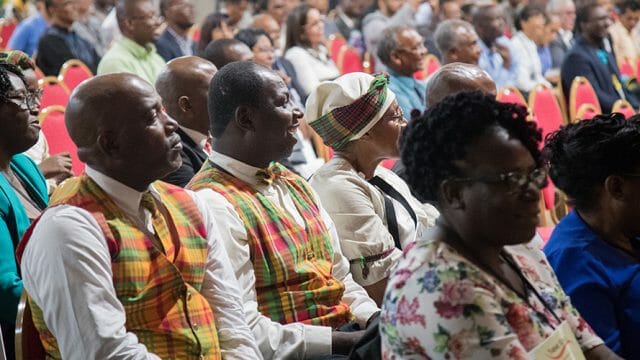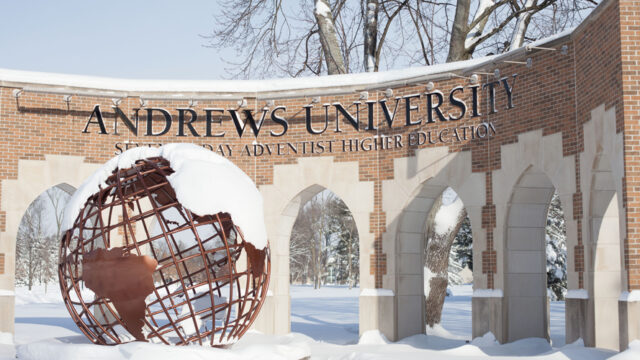Is the prophetic gift limited
to the past?

After a church meeting, a teenager asked this clear, direct question: “Why does God not speak to me?”
The easy answer would be that God speaks to each one of us through the Bible. But this teenager wanted to know why God was not talking to her.
Many believers wonder why God does not speak directly to them today. While it is true that He spoke to us in the past through the prophets and especially through His Son (Heb. 1:1), we may very well ask, Why does
He not speak to us in our day? In answering this question, we consider whether the prophetic gift ceased with the closing of the Bible canon, or whether God has raised up prophets since then or will do so in the future.
A gift that ceased?
Two opposing views exist regarding the validity of the prophetic gift. Cessationists believe that spiritual gifts, such as speaking in tongues, prophecy, and healing, ceased after the age of the apostles. According to this view, those were supernatural gifts meant to function as a sign in the context of the emergence of the Christian church and the initial spread
of the gospel. The opposing view is continuationism, which teaches that the Holy Spirit can bestow spiritual gifts at any time to people who are not the original 12 disciples.
Cessationism denies the possibility of a resurgence of the gifts, appealing to the principle of sola scriptura, insisting on three propositions: (1) the closing of the biblical canon; (2) the infallible and sufficient authority of the Bible; and (3) the perfect adequacy of the Scriptures to guide the church. In other words, they believe that the testimony given in the closed canon of the Bible is enough to guide the church until the time of the end.
Aside from teaching the Word and communicating the will of God as a regular and sustained ministry, however, prophets were often sent into crisis scenarios. In times of hardship, created either by external causes or by internal conditions of apostasy, prophets provided guidance amid conflict and confusion in these special situations or simply brought a special message at a certain point in the plan of salvation.
Some of these prophets did not become part of the canon (for example, Nathan, Ahijah, and Iddo [2 Chron. 9:29]). What the non- canonical prophets said or wrote was authoritative and binding for the people of their time (2 Sam. 12:7-15), because the authority of a prophetic writing is grounded in its inspiration. The prophetic gift of the non canonical prophets was not given to replace the testimony of the canonical prophets, but rather to satisfy a specific need of the people of God. It must be noted, however, that what such prophets taught was in harmony with God’s revelation to the canonical prophets.
Since the time of John the revelator, the biblical canon has been closed, and other inspired books cannot be added. The question we ask today is Have there been any prophets sent from God since the closing of the biblical canon? And could one rise up in the present or the future?
A desirable gift
The New Testament grants a prominent place to the gift of prophecy among the gifts of the Holy Spirit. Indeed, on one occasion the apostle Paul gives it first place among the ministries most useful to the church, and on two occasions he gives it second place (see Rom. 12:6; 1 Cor. 12:28; Eph. 4:11). Moreover, he encourages believers to eagerly desire this gift (1 Cor. 14:1, 39), even though the Holy Spirit always gives His gifts as He wills.
Thus Paul points out twice that God has appointed prophets within the church (1 Cor. 12:28; Eph. 4:11). What is more, he affirms that the
New Testament church was built on the foundation of the apostles and prophets (Eph. 2:20). These are New Testament prophets because, as Paul says in Ephesians 3:4, 5, the Spirit had revealed the mystery of Christ to apostles and prophets who had not been made known to previous generations. We conclude that this manifestation of the gift of prophecy was not limited to the canon.
A gift for the end-times
Jesus stated that false prophets who would say that they prophesy in His name would appear (Matt. 7:15-23) on this earth. These false prophets would be active in the end time, showing signs and wonders, and trying to deceive even the elect (Matt. 24:24). Jesus gave this warning because a prophetic forgery would appear that would be in contrast to the genuine gift in the end-times.
Speaking particularly of the end- time, Joel prophetically announces the abundant outpouring of the Spirit of God upon His people. This outpouring would manifest itself in young people who will see visions, in older people who will dream dreams, and on sons and daughters who will prophesy (Joel 2:28, 29). How do we know that Joel refers specifically to the end-time? Because this prophecy establishes the time frame for the manifestations of
the gift of prophecy. He mentions cosmic phenomena such as the darkening of the sun and the moon turning into blood. He also speaks of disasters on earth, which are cryptically described as “blood and fire and billows of smoke.” All this must precede “the great and dreadful day of the Lord” (verses 30, 31, NIV).
The apostle Peter applied Joel’s prophecy to the Pentecost experience (Acts 2:16-21), which links the gift of prophecy to the gift of tongues. Why? Joel’s prophecy of the coming prophetic gift is mentioned in the context of the early and latter rain (Joel 2:23-32). Autumn rains, which allowed the seed to germinate and take root, were called early rain. Spring rainfalls, which ripened the grain and prepared for the harvest, were called the latter rain. The Old Testament uses this phenomenon of the Palestinian agricultural cycle as a symbol of the spiritual gift that God gives to His people through His Spirit (Hosea 6:3).
Peter and the other apostles experienced the early rain. The latter rain would come with the same power of the Spirit, and the people of God will manifest the gift of prophecy in their midst. Today, while we, “the remnant whom the Lord calls” (Joel 2:32), await the soon return of Jesus, we are invited to experience the spiritual latter rain. This outpouring of the Holy Spirit will be more abundant than the previous one. It will make “your sons and your daughters . . . prophesy, your old men . . . dream dreams,” and “your young men . . . see visions” (verse 28).
Suggestions for Prayer
- Pray especially for insight into the prophecies of the New Testament that speak to our time.
- Ask God to plant His truths so clearly in your mind that you will never be fooled by a clever counterfeit.
- Express to God your decision to trust Him to guide you in all things and keep you from the dangers of false prophets.








